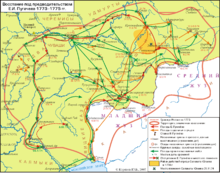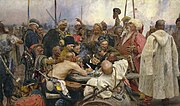| Pugachev's Rebellion | |||||||
|---|---|---|---|---|---|---|---|
 | |||||||
| |||||||
| Belligerents | |||||||
|
• Imperial Russian Army |
• Ural Cossacks • Russian serfs • Old Believers • Bashkirs • Tatars • Chuvashs • Mari people • Mordvins (Erzyas and Mokshas) • Udmurts • Kazakhs • Kalmyks | ||||||
| Commanders and leaders | |||||||
|
Catherine the Great Grigory Potemkin Petr Panin Alexander Suvorov Johann von Michelsohnen Vasily Alexeyevich Kar |
Yemelyan Pugachev Salawat Yulayev | ||||||
| Strength | |||||||
| 5,000+ men[2] |
1773: 1774:
| ||||||
| Casualties and losses | |||||||
| 3,500 killed[2] | |||||||
| Part of a series on |
| Cossacks |
|---|
 |
| Cossack hosts |
| Other Cossack groups |
| History |
| Notable Cossacks |
| Cossack terms |
| Cossack folklore |
Pugachev's Rebellion (Russian: Восстание Пугачёва, romanized: Vosstaniye Pugachyova; also called the Peasants' War 1773–1775 or Cossack Rebellion) of 1773–1775 was the principal revolt in a series of popular rebellions that took place in the Russian Empire after Catherine II seized power in 1762. It began as an organized insurrection of Yaik Cossacks headed by Yemelyan Pugachev, a disaffected ex-lieutenant of the Imperial Russian Army, against a background of profound peasant unrest and war with the Ottoman Empire. After initial success, Pugachev assumed leadership of an alternative government in the name of the late Tsar Peter III and proclaimed an end to serfdom. This organized leadership presented a challenge to the imperial administration of Catherine II.
The rebellion managed to consolidate support from various groups including the peasants, the Cossacks, and Old Believers priesthood. At one point, its administration claimed control over most of the territory between the Volga River and the Urals. One of the most significant events of the insurrection was the Battle of Kazan in July 1774.
Government forces failed to respond effectively to the insurrection at first, partly due to logistical difficulties and a failure to appreciate its scale. However, the revolt was crushed towards the end of 1774 by General Michelsohn at Tsaritsyn. Pugachev was captured soon after and executed in Moscow in January 1775. Further reprisals against rebel areas were carried out by General Peter Panin.
The events have generated many stories in legend and literature, most notably Pushkin's historical novel The Captain's Daughter (1836). It was the largest peasant revolt in the history of the Russian Empire.
- ^ "Catherine the Great". Encyclopedia Britannica. Retrieved 9 October 2019.
- ^ a b c d e f Tucker, Spencer C. (2017). The Roots and Consequences of Civil Wars and Revolutions: Conflicts that Changed World History. ABC-CLIO. p. 140. ISBN 9781440842948. Retrieved 9 October 2019.
- ^ (in Russian) К. Амиров. Казань: где эта улица, где этот дом, Казань, 1995., стр 214–220